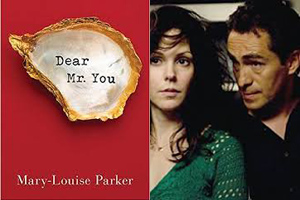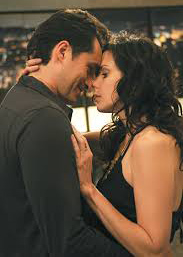Dear Mr. You Dances With Weeds

Mary-Louise Parker’s book Dear Mr. You exposes the author’s soul; revealing wounds and celebrated experiences of joy, anticipation, love, sorrow and terror. Despite being deeply personal, Dear Mr. You also mirrors many others souls. Mary-Louis Parker reflects her art of writing, acting and dancing between Dear Mr. You and the series Weeds. A comparative analysis of the chapter “Dear Cerberus” from Dear Mr. You and the characters, Nancy Botwin and Esteban Reyes from Weeds will specifically suture threads between life, Cerberus and art, Esteban. The exploration begins with the dance.
The Joy of the Dance
The inevitable push and pull of human relationships lead to a dance of sorts. As one person leads, the other is led. “Dear Cerberus” referenced dancing components such as: “I tugged at my tutu…” (Parker, “Dear Mr. You” 1079). “There was plenty of floor space for my routines, which delighted you”(1105). “One evening you came home with a pair of yellow stockings for me and I put them on and did a jig that made you howl”(1105). In Weeds, there was a singular dance, which stands out, a bump and grind – “The Brick Dance” (“Weeds”S3 E3). Esteban’s solider Guillermo demanded Nancy to perform an impromptu dance for her life. This ‘Brick Dance’ endeared Nancy to Guillermo and initiated the prelude to a dance with Esteban. Throughout several seasons, Nancy danced with both Esteban and Guillermo in some manner. Yet, Nancy and Esteban’s Latin tempo dance began with a quickening of anticipation.
The Anticipation of Seduction
Lust and love can produce a lost sense of self. The anticipation of seduction preceded the illusion of love in both “Dear Cerberus” and Weeds. In Weeds Nancy and Esteban had a brief moment of allure by way of the tunnel (S4 E6). Sights were set, and a shared need to satiate desire was met. Both Cerberus and Esteban romanced by kidnapping, verbal reprimand, flirting, assault, reckless and aggressive sexual mayhem such was evident by the flesh torn marks on Nancy’s back as she walked the tunnel of shame (S4 E8). In “Dear Cerberus,” the author spoke more on torn flesh. “I was covered in bruises and teeth marks, and your back looked like you’d been attacked by a raccoon” (1132). Cerberus and Weeds dance of seduction and lust began to tap into love.
Love

Love entered the dance floor with a melodic tempo. “’Let’s go back to my place’, you said, putting your head in my lap. My head started to spin and you said…. Please come back with me. When I’m not with you all I’ll do is think of you” (1079). Esteban displayed his love for Nancy after several failed attempts to connect; he waited for her one evening on her front porch in Ren Mar, and in the simplest act of human connection they sat silently in love gazing at twinkling lights (S4 E9). In season 4 episode 12 Esteban Reyes asks, “Do you care to dance with me Nancy Botwin?” and while they were slow dancing and being tender with each other, there is a tumulus discord happening in the tunnel. Nancy asked Esteban “Do you love me, are you in love with me?” Esteban just repeated her question and did not answer directly. He presented his machismo side and said, “You don’t ask the Mayor of Tijuana if he is in love” (S4 E12).
Loves’ complicated intersections continue when living arrangements evolved. Esteban asked Nancy to move into his Villa, and the move-in happened in “Dear Cerberus.”
I moved into your cage that night… I felt famous. I’d always wanted to be that girl! The one with a dog so consumed with her that every passerby would take one look at us and want to go home and overdose. It was glorious; faces of all nationalities falling into the same mask of failure: I’ll never be loved like that, they all seemed to say, while you pawed me (1105).
The Sorrow of Betrayal
“Curl up on your vintage gynecological chair with your flask or your cigar…

You mistreated me. You know who you are”(1079). Signs of betrayal emerged in “Dear Cerberus” and the gynecological chair made an appearance in Weeds as well. Nancy’s moral compass was activated when young girls, weapons and narcotics came through the tunnel. She addressed her concerns with Esteban but did not get the response she had hoped. She justified her morals by contacting the authorities regarding illegal contraband transported through the tunnel. Consequently, the tunnel was raided; Esteban’s cartel was exposed, and he was devastated to find out that Nancy betrayed him. Nancy, in fear of her life, tells Esteban she is pregnant, and it feels like a boy. Through the spin of betrayal, morals, contempt and a promise of a new life, Nancy is forced onto a gynecological chair to be examined. Esteban’s perceived betrayal made him determined to find out “… that in your flat stomach, there is a baby, that is both male and mine”(S5 E1).
The Terror of Rape
“Rape is a fact of life across cultures” (McKibbin, et al. “Why Do Men Rape?”). “Dear Cerberus” is loaded with physical, verbal, emotional, reckless, and aggressive sexual mayhem “I put my fingertips to my scalp and they came away bloody as you whispered ‘Keep your mouth shut about this’ didn’t you” (1079). Rape is clear in the following passage “Pushing my nose to the mirror you said, ‘You look like a slut!’ ‘I said, ouch, my hair!’ …but then you shoved your hands down my pants…. You ripped them down and rammed inside of me from behind…. You left me staring in the bathroom mirror, pants down” (1105). In Weeds Esteban raped Nancy. He grabbed her by the hair and slammed her over a table, ripped down her pants, and rammed inside of her from behind, while she was pregnant. He left her exposed, devastated, humiliated and vulnerable as she lay bent over the table and his thug Cesar, told her “It is time to go home”(S5 E2).
Endings
“Dear Cerberus” and Weeds captured raw and tender moments of life, which danced wildly through the chambers of the human soul. Still, with a quiet crash the mirror shattered and the cracks rippled through the reflection. The space between the faults filled with whispers of human emotions. The accumulation of human experience builds and expands; they are measured, questioned and examined like a prism of reflected light that refracts the parallels of many human emotions. Love is one of the more challenging human emotions; however, through the writing of Dear Mr. You, and the acting in Weeds the human soul waltzes through the intersections of joy, anticipation, sorrow, and terror only to brush against the illusive illusion of love.
I don’t believe in endings, happy or sad, so my relationships with you continue to this day (1079).
Work Cited
McKibbin, William, et al. “Why Do Men Rape?” Review of General Psychology 12.1 (2008): 86-97. Web. 21 Mar. 2016.
Parker, Mary-Louise. Dear Mr. You. New York: Scribner, 2015. eBook.
“Weeds.” Creator. Jenji Kohan. Perf. Mary-Louise Parker, Hunter Parrish, Alexander Gould. Showtime, 2005-2012.Television.
What do you think? Leave a comment.











Excellent work here! This turned out great. I’m glad the article tackled intriguing concepts–from the influence of dance to darker subjects such as sexual violence. It certainly captures the nuances of Mary-Louise Parker’s personal experiences.
Thank you Emily for your careful reading. Sometimes we all struggle with topics that are emotionally charged and having a great community of writers and editors help to bring us back to a mindful place.
I’ve always enjoyed Mary Louise Parker’s acting, particularly on Weeds, but I had no idea she was such a great writer as well! This was an interesting book, honest and deeply personal.
Yes, Branda MLP used an interesting format to present her experiences and it makes for a reading you can stop and think and then pick it up again without loosing your place.
What a unique take on memoir.
Yes, format was great.
I had no idea that Parker has written a book. I’ll pick it up! thank you.
So glad to have given you an interest in reading more of MLP’s book!
Super work! Loved your article. Pretty intense.
Munjeera love your name. You offered tremendous support for this article and women and their experiences. I really appreciate your encouragement and behind the scenes cheering.
Thank you! I like expanding my horizons on this site. Take care and all the best.
Made me consider Weeds and MLP in a new light. Like a good article should, it made me learn something and fed a new interest. Good job!
Dear Mr. Dean. Thank you for your editing skills and allowing me to be more clear and focused. Thank you for your kinds words of ‘ elegant’ and ‘literary’ writing style! Thank you for being open to experiencing new mediums concerning the contributions of the multi-talented MLP.-Venus
Poetic and raw and beyond my expectations.
Brandag-Nice!!!
I already adored her as an actress, but as a writer she is brilliant.
Thank you Coyne, for taking the time to read, respond and share your thoughts on Ms. Parker.
Probably one of the most beautiful books I’ve ever read. Mary-Louise Parker is a poet, an artist…
Yes, I appreciate the how she set up the book and let us into her world and shared intimate moments of joy and not so joyous acts of life. I get lost in her acting as well. Would like to see more of the dancing part of her life.
This is lovely.
Jinny, thank you for your appreciation of the depths of our humanity.
quirky and profound
Cur, I have this line the resonates your thoughts of quirky and profound.
“There was a time and there was a girl she was funky and dreamy, with real baby fat and a wiggly mouth. Floating through the East Village, she was a muse waiting to happen. She was I (1097).”
Always one of my favorite actresses, is now at the top of my list of favorite writers.
Yes, this was a great read on many levels.
I finished the book feeling like I would like to take her out for a glass of wine and talk about it all or nothing.
Paulson, I get the feeling she would. If you get ahold of her let me know 🙂
It’s unfair that one person can be so talented! I hope she writes more!
Yes, Echo it will be interesting to read what she writes next.
Parker has written an engaging, funny, and powerful book.
Very nice description of the book Almed.
Really beautiful and honest.
Thank you for your time and lovely words.
I loved that she uses the letters to reveal herself in degrees and that she shows weakness and growth as a person.
Yes, Jalisa there is life and there is growth within the pages.
My favorite book this year! She writes beautifully.
Indeed!
Great article on such an important book. I was pleasantly shocked by the beauty of Parker’s article and her insight into the human psyche.
Thank you; yes, it swiftly rips the healing wound right off the skin and exposes the tenderness beneath.
This definitely gets into the seedier aspects of life.